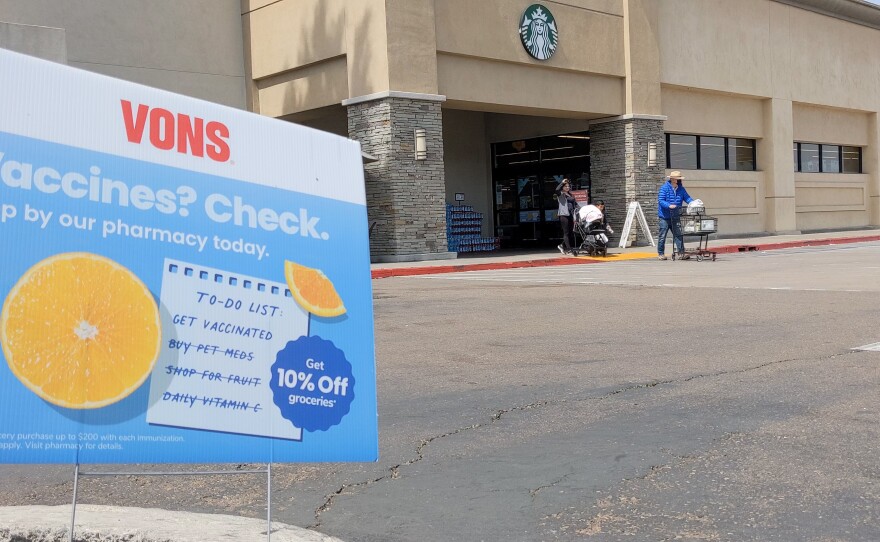U.S. regulators on Friday authorized the first COVID-19 shots for infants and preschoolers, paving the way for vaccinations to begin next week.
An FDA advisory panel give its approval Wednesday for COVID-19 vaccines for kids aged 6 months to 5 years. The advisers found vaccines from Moderna and Pfizer-BioNTech effective for this age group when administered in multiple lower doses.
Formal approval must be obtained from the Centers for Disease Control and Prevention. A CDC advisory committee meets this weekend. White House officials say the vaccines could be available as early as next week.
Dr. Mark Sawyer, an infectious disease specialist with Rady Children's Hospital and UC San Diego who served on the FDA advisory panel that approved the COVID-19 vaccines, joined KPBS Midday Edition to answer some questions about the vaccines for babies and toddlers. The conversation transcribed below has been lightly edited for clarity.
Q: COVID-19 vaccines for adults have been available for about a year and a half now. Why has it taken so long for vaccines to be approved for very young kids?
A: Well, as I think most people know, COVID as a disease is generally less severe in children. And, as a result, we had to be extra careful about the safety to make sure that the risk and benefits still suggested that going ahead with vaccine was a good idea. And this is the way most vaccines are developed that are given to both adults and kids. We start in adults and then move to children. So, for both those reasons, it's taken this long.
Q: Will children as young as 6 months be getting the same vaccine that older children and adults receive?
A: It's the same composition. The dose is lower, but it's exactly the same in every other way. And that is another thing that took some time, was to find the right dose for the youngest age group.
Q: And how many shots will they need?
A: Well, that is when it starts to get complicated. The Pfizer-BioNTech vaccine is going to be a three-shot regimen, and the Moderna vaccine is going to be a two-shot regimen, at least at the beginning. I do want people to know that Moderna is exploring whether a third dose will improve the immune response there. So they may both end up being three doses, but, at the moment, there's a difference between the two.
Q: And how far apart do those shots have to be delivered to kids?
A: Well, for the first two doses, it's the same as it has been for older children and adults. So the Moderna vaccine is spaced apart by four weeks, and the Pfizer-BioNTech vaccine is spaced apart by three weeks for the first two doses. And then, for Pfizer-BioNTech, the dose No. 3 comes two months after the second dose. So it's three weeks, and then two months, and then you're done with the Pfizer-BioNTech series.
Q: Is there a concern that that is too complicated?
A: I certainly have that concern. You need a scorecard to keep track of the dose and the interval and whether a third dose is needed or not. So, you know, COVID vaccines in general have become very complicated. As we learn more about the vaccine, and as new variants of SARS-CoV-2 emerge, we're having to continuously adjust the vaccine schedule. So I understand why people are sort of fed up with all the changes and the rapidity with which those changes are occurring. But it's the best we can do given the science we have.
Q: What is the data telling us about how effective the vaccines are in young children?
A: Well, the vaccines were approved based on the fact that they generate an immune response that's equivalent, or maybe even a little better than the immune response we saw in young adults. That's how the FDA went about deciding that the vaccine should be approved. So we are hoping and assuming that that means they will be as effective in children as they are in adults. But there's not that much data yet. Until we start to use them widely in children, then we'll really have an accurate assessment of exactly how effective they are. One of the points that we should make sure everyone thinks about here is: There are different levels of effectiveness. You can have a vaccine that's effective at preventing all infection — that would be great — but that's not happening now in the omicron era. People are still getting infected. But the important point for people to remember is, even though they may be getting infected, once you're vaccinated, you're not going to get severe disease. You're not going to end up in the hospital or on a ventilator or dying from COVID. And that's the effectiveness that's the most important.
Q: What kinds of side effects have been reported?
A: Very similar side effects to what we see in older children and adults: sore arms, you may not feel great for a day or two after you're vaccinated, young children have a little bit of fever associated with the vaccine. All of those are temporary short-term side effects. The good news is, in the clinical trials, no cases of myocarditis have occurred in this young age group, which is something we did see in the adolescent age group. So I'm reassured that the safety profile is probably even better in younger children than it was in adolescents and adults.
Q: The White House has said the vaccine could be available as soon as next week. Will the vaccines be available through a pediatrician or some other way?
A: The vaccine is going to be available for pediatricians to order. I know that Rady Children's Hospital is getting prepared to set up their vaccine clinics starting next week. San Diego County Public Health is also rolling out vaccine clinics, so it will be available in a number of places. It may even be available in some pharmacies, although not all pharmacies are going to be able to take the youngest age group, simply because they're not used to dealing with that young population.
Q: How do you see the ability to get kids this young vaccinated changing life for families?
A: Well, there's a number of important things that the vaccine is going to provide. There is a subset of parents who continue to be very concerned about COVID and COVID exposures, so much so that they've isolated their children from all of their regular activities. And this vaccine is going to provide reassurance to those parents that their children are protected from severe disease and hopefully will allow them to feel more comfortable starting to let their kids socialize in appropriate group settings. There's another subset of parents who have high risk individuals in their larger family or household, and, for them, this is going to be beneficial so that we can minimize the exposure of those high-risk people to COVID in the household.
Q: Only about 30% of kids in America, 5 through 11, have gotten vaccinated so far, and they've been eligible to receive the vaccine since last year. Are you concerned that parents will be hesitant to get their very young children vaccinated?
A: I'm sure there will be a subset of parents who hesitate and want to wait even longer to vaccinate. The important points that I want those parents to think about as they make that decision is that, although COVID is generally not severe in young children, it can be severe. We've had dozens and dozens of children hospitalized here at Rady Children's Hospital. We've had children on ventilators. Nationally, hundreds of children have actually died of COVID, including children who do not have underlying health conditions. So it's not a totally benign disease in children. And you're weighing that against the vaccine risk and your assessment of that? When I make that comparison, I come out in favor of the vaccine. In other words: The risk from the vaccine is lower than the risk of getting COVID. And I'm going to certainly recommend to my three grandchildren who are now going to be eligible to get vaccinated, that they get vaccinated as soon as possible.
-
An FDA advisory panel has given approval for COVID vaccines for kids aged 6-months to 5 years.









